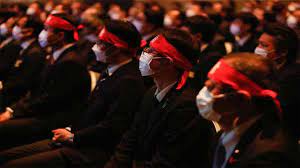TOKYO (Reuters): Largest Japanese industrial labour group said on Thursday that 25 of its member unions have so far had their wage demands met in full from management, agreeing to raise full-time workers’ pay 6.7 per cent during annual wage talks that end next week.
The pay hike was the biggest since the UA Zensen, an umbrella group that represents 2,237 unions, was established in 2012, likely adding to the momentum of the ongoing negotiations. Strong wage growth is expected to pave the way for the central bank to normalise monetary policy.
Speculation persists that the Bank of Japan (BOJ) may lift negative interest rates at its policy-setting meetings at either its March 18-19 or April 25-26 meetings.
UA Zensen is seeking a total wage increase of 6pc, 4pc of which are to be in base pay hikes, at this year’s Japan’s wage talks between blue-chip companies and unions.
Last year, Japanese firms offered workers the highest wage hikes in 30 years. Average Japanese workers’ wages had remained stagnant since the asset-bubble burst in the early 1990s.
UA Zensen represents 1.8 million workers in the service, textiles, distribution and other sectors, making it Japan’s largest sector-to-sector union.
For the second straight year, UA Zensen’s pay demand exceeded that of Rengo, Japan’s largest trade union confederation, which called for pay hikes of 5pc or more this year.
JAPAN REAL WAGES FALL BUT SLOWEST RATE IN 13 MONTHS
Japanese workers’ real wages shrank in January for the 22nd consecutive month but at the slowest pace in over a year on weakening price pressures, data showed on Thursday.
The country’s wages trend is one of crucial data points the central bank watches to gauge pay and inflation outlooks, factors to consider in unwinding its massive stimulus programme.
BOJ Governor Kazuo Ueda has expressed hope that even if real wages don’t turn positive immediately, this year’s labour-management pay negotiations will yield solid results to boost domestic consumption.
Inflation-adjusted real wages, a barometer of consumer purchasing power, slipped 0.6pc in January from a year earlier, data from the labour ministry showed, following a revised 2.1pc fall in December. The pace of decline was the joint-slowest since December 2022.
The consumer inflation rate the government uses to calculate real wages, which includes fresh food prices but excludes rent or equivalent, rose at the slowest pace since March 2022 at 2.5pc due to waning cost-push inflation from commodity imports.
Despite falling short of outpacing inflation, nominal pay grew at 2.0pc year-on-year in January, posting the biggest growth since last June. That followed a revised 0.8pc hike in December.
The pay bump was attributed to 16.2pc advance in special payments reflecting winter bonuses, a labour ministry official said.
Regular or base salary in January went up 1.4pc year-on-year, the same as a revised figure in the previous month. Overtime pay, an indicator of business activity strength, edged up by 0.4pc year-on-year, followed by a revised 1.2pc decrease.
Japanese businesses are on the cusp of wrapping up the annual collective pay talk season known as “shunto.” The labour unions are demanding pay rises well in excess of last year’s hikes, which were the biggest in more than three decades.
Core consumer inflation in Japan’s capital, a leading indicator of nationwide price trends, exceeded the BOJ’s 2pc target, the government said on Tuesday.
However, an index of stripping out the effect of energy costs slowed in February, shifting the focus on whether Japan can see wage hikes strong enough to underpin consumption.







